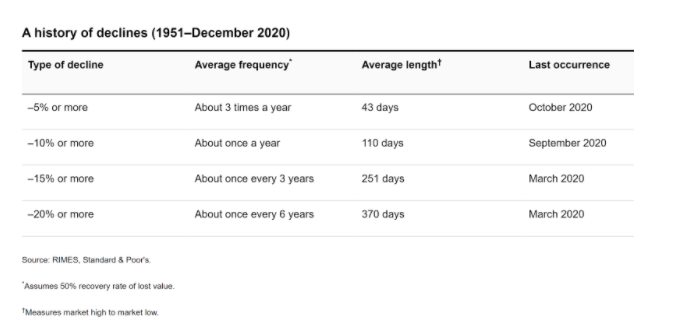
By Scott Hamilton
After a three-year rally, the financial markets have been down for seven straight days, marking their worst slide since the pandemic decline in March of 2020. (1) Monday’s market dip put the S&P 500 down over 10%, which is officially called a “correction” on Wall Street. (2)
In addition to the stock market decline, inflation has been causing concerns. Because inflation is reaching 40-year highs, it is expected that the Federal Reserve will begin raising interest rates in the spring, which could potentially slow the economy. (3)
Investors are understandably nervous about their investments and their purchasing power. If you are worried about your portfolio, you’re not alone. But during stock market volatility, it’s important to keep a level head to avoid financial mistakes.
Table of Contents
Stay Calm
At times like these, it’s important to put current conditions into perspective. This is not the first time the market has taken a tumble and it won’t be the last. Declines in the Dow Jones Industrial Average are actually fairly regular events. In fact, drops of 10% or more happen about once a year on average: (4)

Ride Out the Uncertainty Storm
It’s important to remember that markets dislike uncertainty. Currently, there is a lot of uncertainty regarding the continued coronavirus pandemic, inflation, interest rate hikes, tensions between Russia and Ukraine, and earnings reports due out for several large technology companies.
With so much uncertainty, volatility right now is extreme. The VIX, or the market volatility index, is at the highest level in nearly a year. (5) As we get more information, it is likely that day-to-day market fluctuations will decrease.
Play Dead
There’s an old saying that the best thing to do when you meet a bear market is the same as if you were to meet a bear in the woods: play dead. While easier said than done, successful long-term investors know that it’s important to stay calm during a market correction. We don’t know yet whether the coronavirus fears will translate into an official correction, but the risk always exists.
Market volatility has increased in recent years and the media can often make it seem like each episode is worse than the one before. In reality, volatility does not hurt investors, but selling when the market is down will lock in losses.
Remember That Your Portfolio Is Diversified
Fears about inflation, volatility, and market declines are stressful. However, it is important to keep in mind that while the stock market is down, your portfolio is made up of both stocks, bonds, and other assets that are designed to work together to decrease overall losses. It’s important to consider your specific portfolio, investment horizon, and circumstances when reflecting on economic events. If you have questions about your portfolio, get in touch with our office.
Review Your 401(k) and Other Accounts
Now is a good time to take a look at all of your investment accounts, including your 401(k) to make sure it is well diversified. If you have not rebalanced your other investment accounts in the last year, get in touch with our office and we’ll take a look and offer recommendations to minimize potential losses.
Speak With Your Advisor
Whether you’re new to investing or an experienced investor, it’s helpful to consult with an objective third party. Human nature causes us all to act out of emotion when our accounts go down. As an independent firm, we put your best interests first. We seek to serve as a support system for our clients, helping them make informed financial decisions that aren’t driven solely by emotion.
We’re Here for Your Friends and Family
If you have friends or family who need help with their investments, we are happy to offer a complimentary portfolio review and recommendations. We can discuss what is appropriate for their immediate needs and long-term objectives. Sometimes simply speaking with a financial advisor may help investors feel more confident and less concerned with the day-to-day market activity.
About Scott
Scott Hamilton is founder and chief financial officer at Hamilton Financial Planning, a wealth management firm that specializes in providing comprehensive financial planning for retirees. With over 20 years of experience in the financial industry, and having completed over 250 financial plans for retirees across all industries, but mostly the oil and gas industry, Scott is passionate about providing his clients with the tools and insight they need to achieve their financial goals. He has a Bachelor of Business Administration in finance from Texas State University and an MBA in international finance from Pepperdine University. Scott has also been happily married to his wife, Gayle, for over 25 years. To learn more about Scott, connect with him on LinkedIn.
______________
(1) https://www.cnbc.com/2022/01/23/stock-market-futures-open-to-close-news.html
(2) https://www.forbes.com/advisor/investing/what-is-market-correction/
(4) https://www.capitalgroup.com/individual/planning/market-fluctuations/past-market-declines.html
(5) https://seekingalpha.com/news/3790661-sp-500-etfs-fall-as-the-vix-crosses-above-32

